Module 4 Rules and suggestions 提升练习(含解析) 2024-2025学年外研版九年级英语下册
文档属性
| 名称 | Module 4 Rules and suggestions 提升练习(含解析) 2024-2025学年外研版九年级英语下册 |
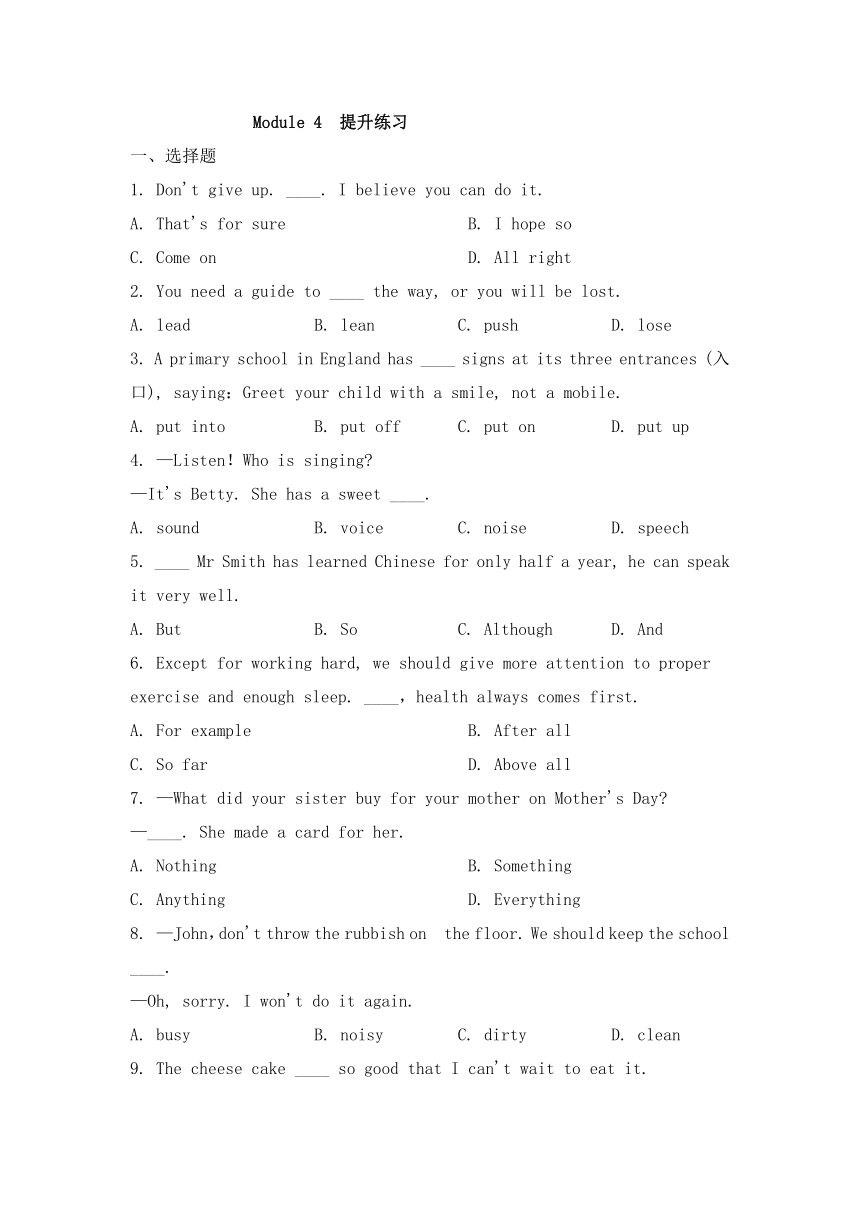
|
|
| 格式 | docx | ||
| 文件大小 | 26.9KB | ||
| 资源类型 | 教案 | ||
| 版本资源 | 外研版 | ||
| 科目 | 英语 | ||
| 更新时间 | 2025-03-07 14:45:22 | ||
图片预览

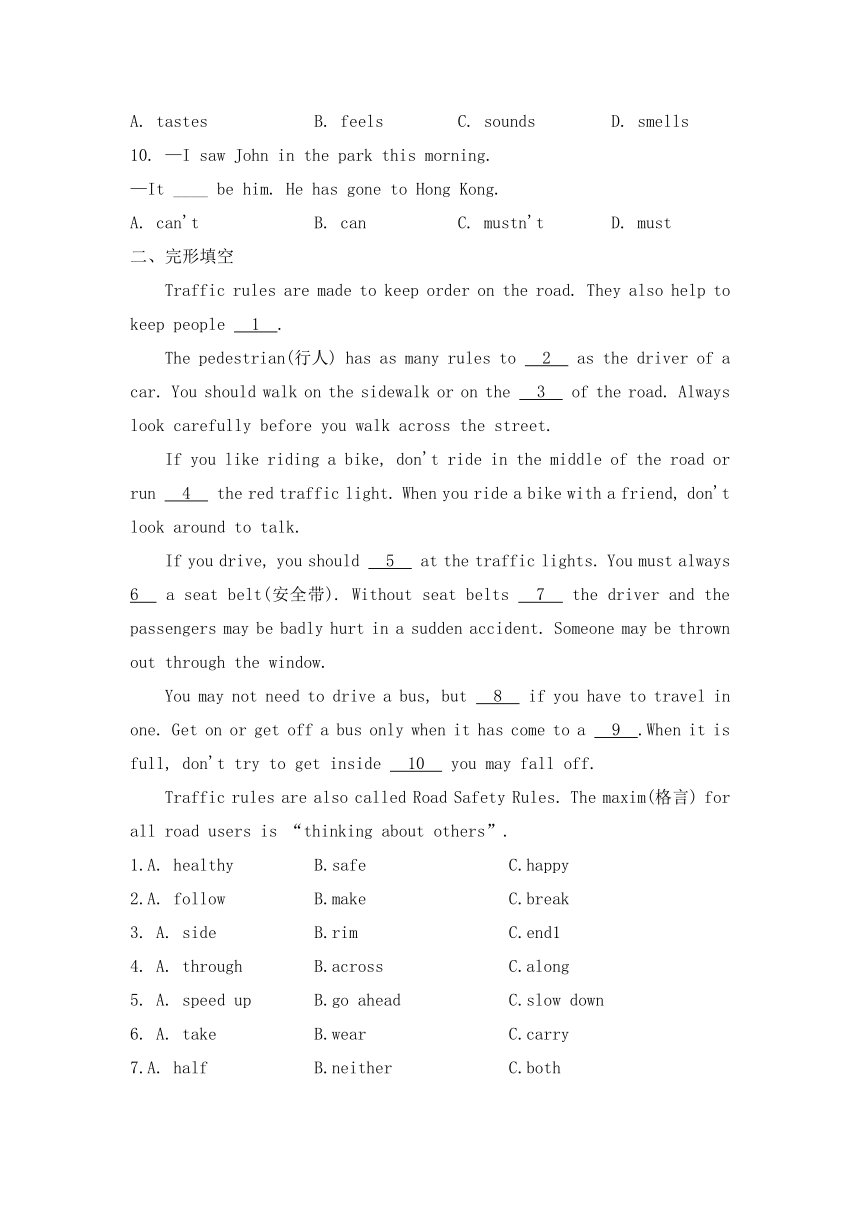
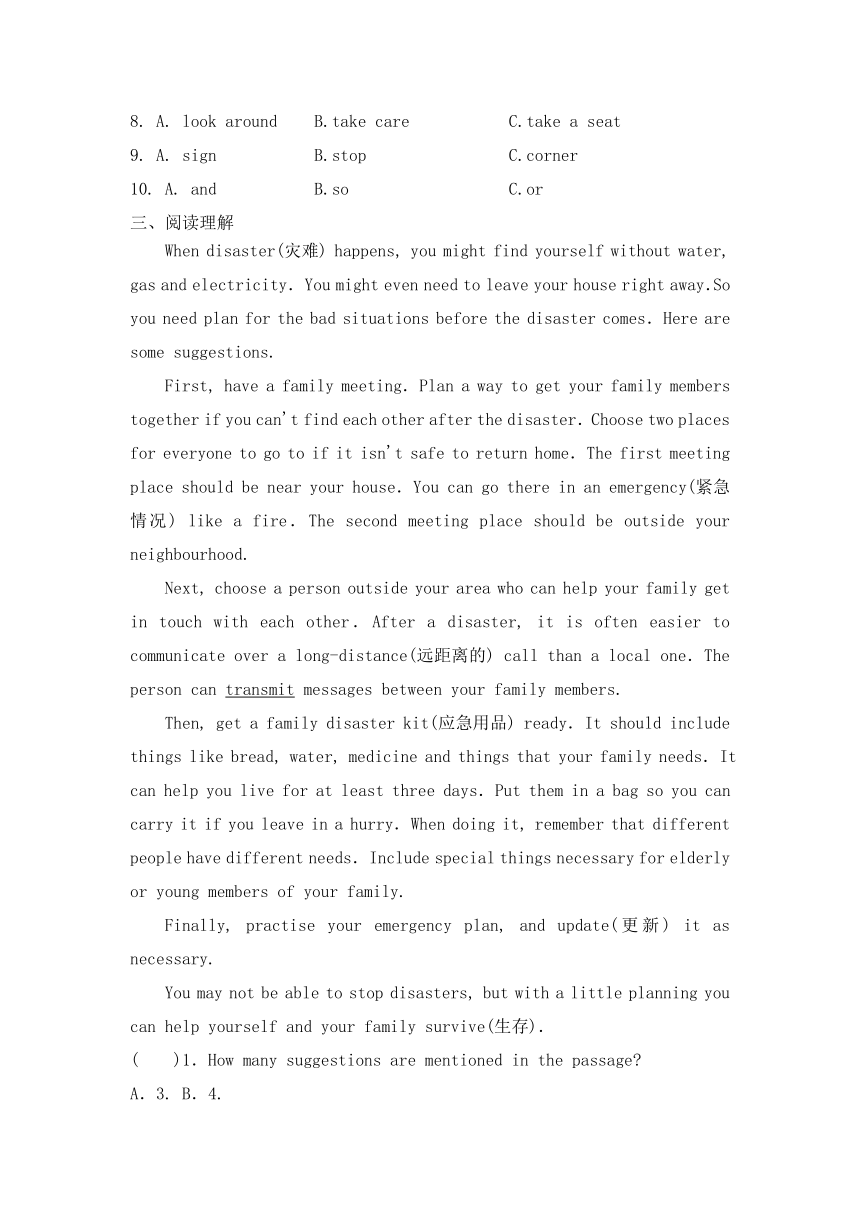
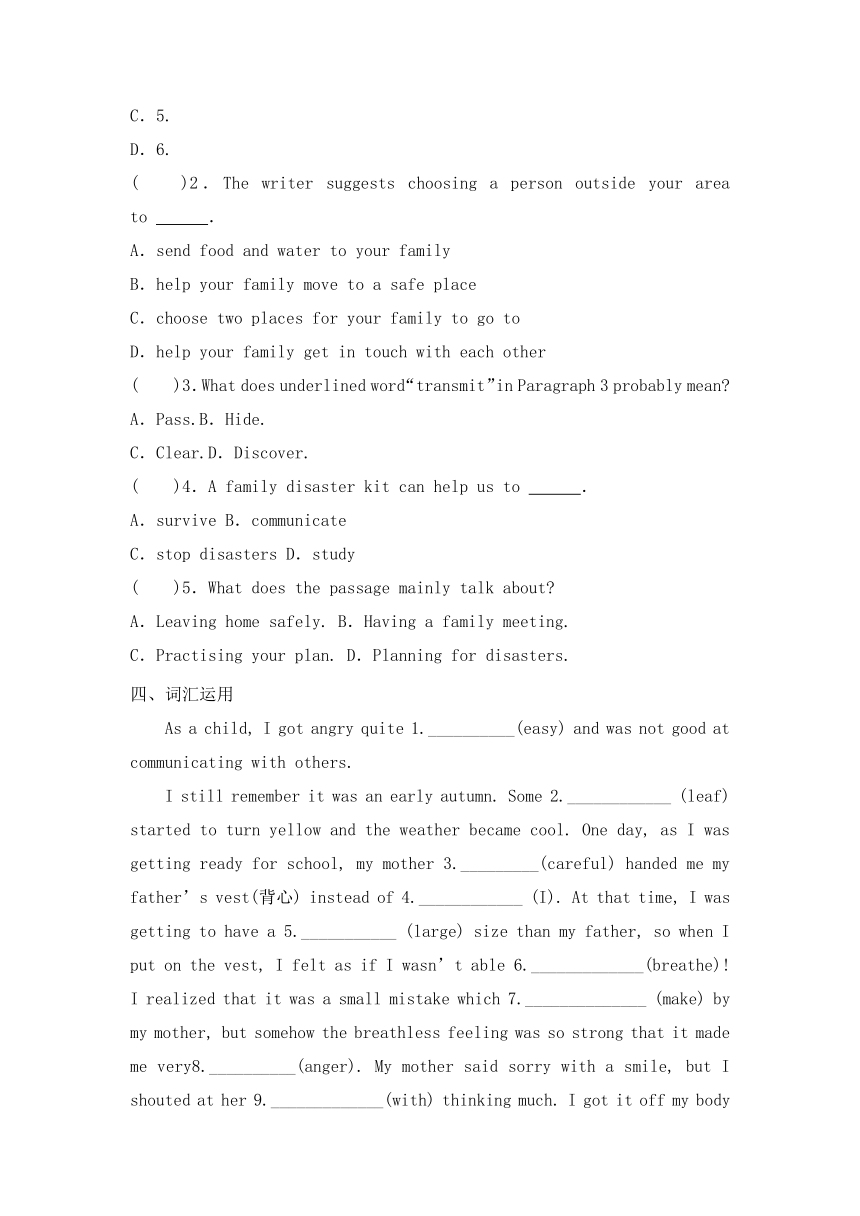
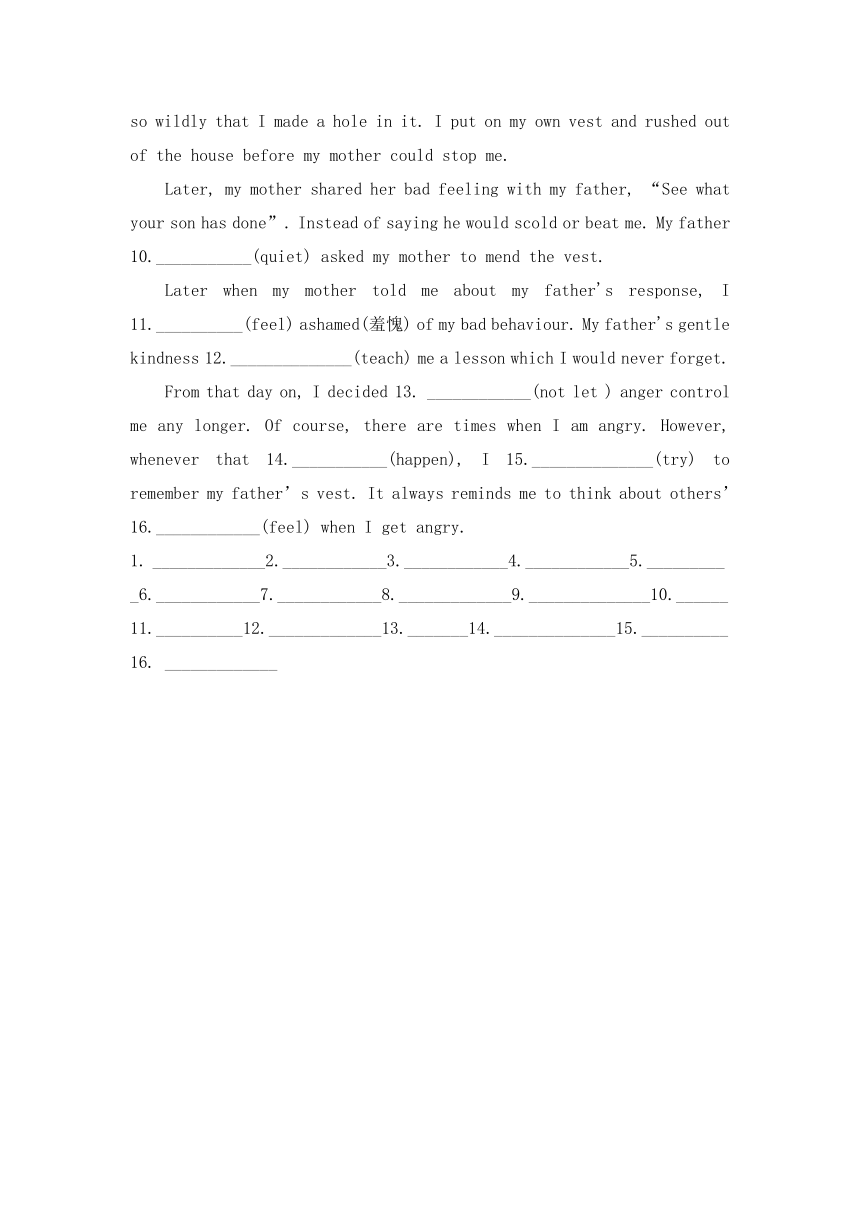
文档简介
Module 4 提升练习
选择题
1. Don't give up. ____. I believe you can do it.
A. That's for sure B. I hope so
C. Come on D. All right
2. You need a guide to ____ the way, or you will be lost.
A. lead B. lean C. push D. lose
3. A primary school in England has ____ signs at its three entrances (入口), saying:Greet your child with a smile, not a mobile.
A. put into B. put off C. put on D. put up
4. —Listen!Who is singing
—It's Betty. She has a sweet ____.
A. sound B. voice C. noise D. speech
5. ____ Mr Smith has learned Chinese for only half a year, he can speak it very well.
A. But B. So C. Although D. And
6. Except for working hard, we should give more attention to proper exercise and enough sleep. ____,health always comes first.
A. For example B. After all
C. So far D. Above all
7. —What did your sister buy for your mother on Mother's Day
—____. She made a card for her.
A. Nothing B. Something
C. Anything D. Everything
8. —John,don't throw the rubbish on the floor. We should keep the school ____.
—Oh, sorry. I won't do it again.
A. busy B. noisy C. dirty D. clean
9. The cheese cake ____ so good that I can't wait to eat it.
A. tastes B. feels C. sounds D. smells
10. —I saw John in the park this morning.
—It ____ be him. He has gone to Hong Kong.
A. can't B. can C. mustn't D. must
二、完形填空
Traffic rules are made to keep order on the road. They also help to keep people 1 .
The pedestrian(行人) has as many rules to 2 as the driver of a car. You should walk on the sidewalk or on the 3 of the road. Always look carefully before you walk across the street.
If you like riding a bike, don't ride in the middle of the road or run 4 the red traffic light. When you ride a bike with a friend, don't look around to talk.
If you drive, you should 5 at the traffic lights. You must always 6 a seat belt(安全带). Without seat belts 7 the driver and the passengers may be badly hurt in a sudden accident. Someone may be thrown out through the window.
You may not need to drive a bus, but 8 if you have to travel in one. Get on or get off a bus only when it has come to a 9 .When it is full, don't try to get inside 10 you may fall off.
Traffic rules are also called Road Safety Rules. The maxim(格言) for all road users is “thinking about others”.
1.A. healthy B.safe C.happy
2.A. follow B.make C.break
3. A. side B.rim C.end1
4. A. through B.across C.along
5. A. speed up B.go ahead C.slow down
6. A. take B.wear C.carry
7.A. half B.neither C.both
8. A. look around B.take care C.take a seat
9. A. sign B.stop C.corner
10. A. and B.so C.or
三、阅读理解
When disaster(灾难) happens, you might find yourself without water, gas and electricity.You might even need to leave your house right away.So you need plan for the bad situations before the disaster comes.Here are some suggestions.
First, have a family meeting.Plan a way to get your family members together if you can't find each other after the disaster.Choose two places for everyone to go to if it isn't safe to return home.The first meeting place should be near your house.You can go there in an emergency(紧急情况) like a fire.The second meeting place should be outside your neighbourhood.
Next, choose a person outside your area who can help your family get in touch with each other.After a disaster, it is often easier to communicate over a long-distance(远距离的) call than a local one.The person can transmit messages between your family members.
Then, get a family disaster kit(应急用品) ready.It should include things like bread, water, medicine and things that your family needs.It can help you live for at least three days.Put them in a bag so you can carry it if you leave in a hurry.When doing it, remember that different people have different needs.Include special things necessary for elderly or young members of your family.
Finally, practise your emergency plan, and update(更新) it as necessary.
You may not be able to stop disasters, but with a little planning you can help yourself and your family survive(生存).
( )1.How many suggestions are mentioned in the passage
A.3. B.4.
C.5.
D.6.
( )2.The writer suggests choosing a person outside your area to .
A.send food and water to your family
B.help your family move to a safe place
C.choose two places for your family to go to
D.help your family get in touch with each other
( )3.What does underlined word“transmit”in Paragraph 3 probably mean
A.Pass.B.Hide.
C.Clear.D.Discover.
( )4.A family disaster kit can help us to .
A.survive B.communicate
C.stop disasters D.study
( )5.What does the passage mainly talk about
A.Leaving home safely. B.Having a family meeting.
C.Practising your plan. D.Planning for disasters.
四、词汇运用
As a child, I got angry quite 1.__________(easy) and was not good at communicating with others.
I still remember it was an early autumn. Some 2.____________ (leaf) started to turn yellow and the weather became cool. One day, as I was getting ready for school, my mother 3._________(careful) handed me my father’s vest(背心) instead of 4.____________ (I). At that time, I was getting to have a 5.___________ (large) size than my father, so when I put on the vest, I felt as if I wasn’t able 6._____________(breathe)! I realized that it was a small mistake which 7.______________ (make) by my mother, but somehow the breathless feeling was so strong that it made me very8.__________(anger). My mother said sorry with a smile, but I shouted at her 9._____________(with) thinking much. I got it off my body so wildly that I made a hole in it. I put on my own vest and rushed out of the house before my mother could stop me.
Later, my mother shared her bad feeling with my father, “See what your son has done”. Instead of saying he would scold or beat me. My father 10.___________(quiet) asked my mother to mend the vest.
Later when my mother told me about my father's response, I 11.__________(feel) ashamed(羞愧) of my bad behaviour. My father's gentle kindness 12.______________(teach) me a lesson which I would never forget.
From that day on, I decided 13. ____________(not let ) anger control me any longer. Of course, there are times when I am angry. However, whenever that 14.___________(happen), I 15.______________(try) to remember my father’s vest. It always reminds me to think about others’ 16.____________(feel) when I get angry.
_____________2.____________3.____________4.____________5.__________6.____________7.____________8._____________9.______________10.______
11.__________12._____________13._______14.______________15.__________16. _____________
一、
C。解析:A 选项 “That's for sure” 意为 “那是肯定的”;B 选项 “I hope so” 意为 “我希望如此”;C 选项 “Come on” 有 “加油” 的意思,符合鼓励对方别放弃的语境;D 选项 “All right” 意为 “好吧”。这里是鼓励对方别放弃,选 C。
A。解析:A 选项 “lead” 有 “引领,带路” 的意思,“lead the way” 表示 “带路”,符合需要一个导游带路否则会迷路的语境;B 选项 “lean” 意为 “倾斜,倚靠”;C 选项 “push” 意为 “推”;D 选项 “lose” 意为 “失去,丢失”。选 A。
D。解析:A 选项 “put into” 意为 “把…… 放进,投入”;B 选项 “put off” 意为 “推迟”;C 选项 “put on” 意为 “穿上,上演”;D 选项 “put up” 有 “张贴” 的意思,这里说学校在入口张贴标志,选 D。
B。解析:A 选项 “sound” 指各种声音;B 选项 “voice” 指人的嗓音,这里说 Betty 唱歌,有甜美的嗓音,符合语境;C 选项 “noise” 指噪音;D 选项 “speech” 意为 “演讲”。选 B。
C。解析:A 选项 “But” 表示转折,“但是”;B 选项 “So” 表示结果,“所以”;C 选项 “Although” 表示让步,“尽管”,引导让步状语从句,这里说尽管史密斯先生学中文才半年,但说得很好,符合逻辑;D 选项 “And” 表示并列,“和,并且”。选 C。
B。解析:A 选项 “For example” 意为 “例如”;B 选项 “After all” 意为 “毕竟”,这里说除了努力工作,要多注意锻炼和睡眠,毕竟健康第一,符合语境;C 选项 “So far” 意为 “到目前为止”;D 选项 “Above all” 意为 “首先,最重要的是”。选 B。
A。解析:A 选项 “Nothing” 意为 “没有什么”,根据 “She made a card for her.” 可知没买东西,符合语境;B 选项 “Something” 意为 “某事,某物”;C 选项 “Anything” 常用于否定句和疑问句,意为 “任何事物”;D 选项 “Everything” 意为 “一切事物”。选 A。
D。解析:A 选项 “busy” 意为 “忙碌的”;B 选项 “noisy” 意为 “嘈杂的”;C 选项 “dirty” 意为 “脏的”;D 选项 “clean” 意为 “干净的”,这里说不要扔垃圾,要保持学校干净,选 D。
D。解析:A 选项 “tastes” 意为 “尝起来”,根据 “can't wait to eat it” 说明还没吃,所以不是尝起来;B 选项 “feels” 意为 “感觉起来”,不符合蛋糕给人的感官感受;C 选项 “sounds” 意为 “听起来”;D 选项 “smells” 意为 “闻起来”,蛋糕闻起来很香,等不及要吃,符合语境。选 D。
A。解析:A 选项 “can't” 表示否定推测,“不可能”,根据 “He has gone to Hong Kong.” 可知今天早上在公园看到的不可能是 John;B 选项 “can” 表示推测时多用于否定句和疑问句,意为 “可能”;C 选项 “mustn't” 意为 “禁止”;D 选项 “must” 表示肯定推测,“一定”。选 A。
二、
B。解析:交通规则不仅维持道路秩序,也帮助保障人们的安全,“safe” 表示 “安全的”,选 B。
A。解析:行人也有很多规则要遵守,“follow rules” 表示 “遵守规则”,选 A。
A。解析:应该走在人行道或道路的边上,“side” 表示 “边”,选 A。
A。解析:“run through the red traffic light” 表示 “闯红灯”,“through” 强调从内部穿过,这里指闯红灯,选 A。“across” 强调从表面穿过;“along” 表示 “沿着”。
C。解析:开车时遇到交通信号灯应该减速,“slow down” 表示 “减速”,选 C。“speed up” 表示 “加速”;“go ahead” 表示 “前进,继续”。
B。解析:开车要一直系安全带,“wear a seat belt” 表示 “系安全带”,选 B。
C。解析:“both...and...” 表示 “两者都”,这里说没有安全带,司机和乘客可能都会在突发事故中严重受伤,选 C。
B。解析:坐公交车时要小心,“take care” 表示 “小心”,选 B。“look around” 表示 “环顾四周”;“take a seat” 表示 “就座”。
B。解析:公交车停下时才能上车或下车,“come to a stop” 表示 “停下来”,选 B。
C。解析:公交车满员时不要挤进去,否则可能会摔倒,“or” 表示 “否则”,选 C。
三、
B。解析:文章提到了开家庭会议、选择区域外联系人、准备家庭应急用品、练习应急计划这四条建议,选 B。
D。解析:根据 “choose a person outside your area who can help your family get in touch with each other” 可知选 D。
A。解析:根据语境,这个人能在家庭成员之间传递信息,“transmit” 意为 “传递,传送”,与 “pass” 意思相近,选 A。
A。解析:根据 “It can help you live for at least three days.” 可知家庭应急用品能帮助生存,选 A。
D。解析:文章主要讲了在灾难来临前如何做准备,选 D “为灾难做规划”。
四、
easily。解析:修饰动词 “got angry” 用副词,“easy” 的副词形式是 “easily”,表示小时候很容易生气。
leaves。解析:“some” 后接可数名词复数,“leaf” 的复数是 “leaves”,一些树叶开始变黄。
carefully。解析:修饰动词 “handed” 用副词,“careful” 的副词形式是 “carefully”,妈妈小心地把爸爸的背心递给我。
mine。解析:这里指妈妈把爸爸的背心递给我而不是我的(背心),用名词性物主代词 “mine”。
larger。解析:根据 “than” 可知用比较级,“large” 的比较级是 “larger”,我穿的尺码比爸爸的大。
to breathe。解析:“be able to do sth.” 表示 “能够做某事”,所以用 “to breathe”,感觉好像不能呼吸了。
was made。解析:“mistake” 和 “make” 是被动关系,且动作发生在过去,用一般过去时的被动语态 “was made”,这个小错误是妈妈犯的。
angry。解析:“make sb. + 形容词” 表示 “使某人……”,“anger” 的形容词形式是 “angry”,这种喘不过气的感觉让我很生气。
without。解析:这里说我没怎么思考就对妈妈大喊,“without” 表示 “没有”,后接动名词。
quietly。解析:修饰动词 “asked” 用副词,“quiet” 的副词形式是 “quietly”,爸爸平静地让妈妈修补背心。
felt。解析:文章描述过去的事情,用一般过去时,“feel” 的过去式是 “felt”,我对自己的不良行为感到羞愧。
taught。解析:文章描述过去的事情,用一般过去时,“teach” 的过去式是 “taught”,爸爸的温柔善良给了我一个永远不会忘记的教训。
not to let。解析:“decide not to do sth.” 表示 “决定不做某事”,我决定不再让愤怒控制我。
happens。解析:whenever 引导的时间状语从句,用一般现在时表将来,主语 “that” 是第三人称单数,“happen” 用第三人称单数形式 “happens”。
will try。解析:主句用一般将来时,“try” 用 “will try”,无论什么时候愤怒发生,我都会努力想起爸爸的背心。
feelings。解析:“others’” 后接名词,“feel” 的名词形式是 “feeling”,这里用复数 “feelings”,当我生气时,会想起他人的感受。
选择题
1. Don't give up. ____. I believe you can do it.
A. That's for sure B. I hope so
C. Come on D. All right
2. You need a guide to ____ the way, or you will be lost.
A. lead B. lean C. push D. lose
3. A primary school in England has ____ signs at its three entrances (入口), saying:Greet your child with a smile, not a mobile.
A. put into B. put off C. put on D. put up
4. —Listen!Who is singing
—It's Betty. She has a sweet ____.
A. sound B. voice C. noise D. speech
5. ____ Mr Smith has learned Chinese for only half a year, he can speak it very well.
A. But B. So C. Although D. And
6. Except for working hard, we should give more attention to proper exercise and enough sleep. ____,health always comes first.
A. For example B. After all
C. So far D. Above all
7. —What did your sister buy for your mother on Mother's Day
—____. She made a card for her.
A. Nothing B. Something
C. Anything D. Everything
8. —John,don't throw the rubbish on the floor. We should keep the school ____.
—Oh, sorry. I won't do it again.
A. busy B. noisy C. dirty D. clean
9. The cheese cake ____ so good that I can't wait to eat it.
A. tastes B. feels C. sounds D. smells
10. —I saw John in the park this morning.
—It ____ be him. He has gone to Hong Kong.
A. can't B. can C. mustn't D. must
二、完形填空
Traffic rules are made to keep order on the road. They also help to keep people 1 .
The pedestrian(行人) has as many rules to 2 as the driver of a car. You should walk on the sidewalk or on the 3 of the road. Always look carefully before you walk across the street.
If you like riding a bike, don't ride in the middle of the road or run 4 the red traffic light. When you ride a bike with a friend, don't look around to talk.
If you drive, you should 5 at the traffic lights. You must always 6 a seat belt(安全带). Without seat belts 7 the driver and the passengers may be badly hurt in a sudden accident. Someone may be thrown out through the window.
You may not need to drive a bus, but 8 if you have to travel in one. Get on or get off a bus only when it has come to a 9 .When it is full, don't try to get inside 10 you may fall off.
Traffic rules are also called Road Safety Rules. The maxim(格言) for all road users is “thinking about others”.
1.A. healthy B.safe C.happy
2.A. follow B.make C.break
3. A. side B.rim C.end1
4. A. through B.across C.along
5. A. speed up B.go ahead C.slow down
6. A. take B.wear C.carry
7.A. half B.neither C.both
8. A. look around B.take care C.take a seat
9. A. sign B.stop C.corner
10. A. and B.so C.or
三、阅读理解
When disaster(灾难) happens, you might find yourself without water, gas and electricity.You might even need to leave your house right away.So you need plan for the bad situations before the disaster comes.Here are some suggestions.
First, have a family meeting.Plan a way to get your family members together if you can't find each other after the disaster.Choose two places for everyone to go to if it isn't safe to return home.The first meeting place should be near your house.You can go there in an emergency(紧急情况) like a fire.The second meeting place should be outside your neighbourhood.
Next, choose a person outside your area who can help your family get in touch with each other.After a disaster, it is often easier to communicate over a long-distance(远距离的) call than a local one.The person can transmit messages between your family members.
Then, get a family disaster kit(应急用品) ready.It should include things like bread, water, medicine and things that your family needs.It can help you live for at least three days.Put them in a bag so you can carry it if you leave in a hurry.When doing it, remember that different people have different needs.Include special things necessary for elderly or young members of your family.
Finally, practise your emergency plan, and update(更新) it as necessary.
You may not be able to stop disasters, but with a little planning you can help yourself and your family survive(生存).
( )1.How many suggestions are mentioned in the passage
A.3. B.4.
C.5.
D.6.
( )2.The writer suggests choosing a person outside your area to .
A.send food and water to your family
B.help your family move to a safe place
C.choose two places for your family to go to
D.help your family get in touch with each other
( )3.What does underlined word“transmit”in Paragraph 3 probably mean
A.Pass.B.Hide.
C.Clear.D.Discover.
( )4.A family disaster kit can help us to .
A.survive B.communicate
C.stop disasters D.study
( )5.What does the passage mainly talk about
A.Leaving home safely. B.Having a family meeting.
C.Practising your plan. D.Planning for disasters.
四、词汇运用
As a child, I got angry quite 1.__________(easy) and was not good at communicating with others.
I still remember it was an early autumn. Some 2.____________ (leaf) started to turn yellow and the weather became cool. One day, as I was getting ready for school, my mother 3._________(careful) handed me my father’s vest(背心) instead of 4.____________ (I). At that time, I was getting to have a 5.___________ (large) size than my father, so when I put on the vest, I felt as if I wasn’t able 6._____________(breathe)! I realized that it was a small mistake which 7.______________ (make) by my mother, but somehow the breathless feeling was so strong that it made me very8.__________(anger). My mother said sorry with a smile, but I shouted at her 9._____________(with) thinking much. I got it off my body so wildly that I made a hole in it. I put on my own vest and rushed out of the house before my mother could stop me.
Later, my mother shared her bad feeling with my father, “See what your son has done”. Instead of saying he would scold or beat me. My father 10.___________(quiet) asked my mother to mend the vest.
Later when my mother told me about my father's response, I 11.__________(feel) ashamed(羞愧) of my bad behaviour. My father's gentle kindness 12.______________(teach) me a lesson which I would never forget.
From that day on, I decided 13. ____________(not let ) anger control me any longer. Of course, there are times when I am angry. However, whenever that 14.___________(happen), I 15.______________(try) to remember my father’s vest. It always reminds me to think about others’ 16.____________(feel) when I get angry.
_____________2.____________3.____________4.____________5.__________6.____________7.____________8._____________9.______________10.______
11.__________12._____________13._______14.______________15.__________16. _____________
一、
C。解析:A 选项 “That's for sure” 意为 “那是肯定的”;B 选项 “I hope so” 意为 “我希望如此”;C 选项 “Come on” 有 “加油” 的意思,符合鼓励对方别放弃的语境;D 选项 “All right” 意为 “好吧”。这里是鼓励对方别放弃,选 C。
A。解析:A 选项 “lead” 有 “引领,带路” 的意思,“lead the way” 表示 “带路”,符合需要一个导游带路否则会迷路的语境;B 选项 “lean” 意为 “倾斜,倚靠”;C 选项 “push” 意为 “推”;D 选项 “lose” 意为 “失去,丢失”。选 A。
D。解析:A 选项 “put into” 意为 “把…… 放进,投入”;B 选项 “put off” 意为 “推迟”;C 选项 “put on” 意为 “穿上,上演”;D 选项 “put up” 有 “张贴” 的意思,这里说学校在入口张贴标志,选 D。
B。解析:A 选项 “sound” 指各种声音;B 选项 “voice” 指人的嗓音,这里说 Betty 唱歌,有甜美的嗓音,符合语境;C 选项 “noise” 指噪音;D 选项 “speech” 意为 “演讲”。选 B。
C。解析:A 选项 “But” 表示转折,“但是”;B 选项 “So” 表示结果,“所以”;C 选项 “Although” 表示让步,“尽管”,引导让步状语从句,这里说尽管史密斯先生学中文才半年,但说得很好,符合逻辑;D 选项 “And” 表示并列,“和,并且”。选 C。
B。解析:A 选项 “For example” 意为 “例如”;B 选项 “After all” 意为 “毕竟”,这里说除了努力工作,要多注意锻炼和睡眠,毕竟健康第一,符合语境;C 选项 “So far” 意为 “到目前为止”;D 选项 “Above all” 意为 “首先,最重要的是”。选 B。
A。解析:A 选项 “Nothing” 意为 “没有什么”,根据 “She made a card for her.” 可知没买东西,符合语境;B 选项 “Something” 意为 “某事,某物”;C 选项 “Anything” 常用于否定句和疑问句,意为 “任何事物”;D 选项 “Everything” 意为 “一切事物”。选 A。
D。解析:A 选项 “busy” 意为 “忙碌的”;B 选项 “noisy” 意为 “嘈杂的”;C 选项 “dirty” 意为 “脏的”;D 选项 “clean” 意为 “干净的”,这里说不要扔垃圾,要保持学校干净,选 D。
D。解析:A 选项 “tastes” 意为 “尝起来”,根据 “can't wait to eat it” 说明还没吃,所以不是尝起来;B 选项 “feels” 意为 “感觉起来”,不符合蛋糕给人的感官感受;C 选项 “sounds” 意为 “听起来”;D 选项 “smells” 意为 “闻起来”,蛋糕闻起来很香,等不及要吃,符合语境。选 D。
A。解析:A 选项 “can't” 表示否定推测,“不可能”,根据 “He has gone to Hong Kong.” 可知今天早上在公园看到的不可能是 John;B 选项 “can” 表示推测时多用于否定句和疑问句,意为 “可能”;C 选项 “mustn't” 意为 “禁止”;D 选项 “must” 表示肯定推测,“一定”。选 A。
二、
B。解析:交通规则不仅维持道路秩序,也帮助保障人们的安全,“safe” 表示 “安全的”,选 B。
A。解析:行人也有很多规则要遵守,“follow rules” 表示 “遵守规则”,选 A。
A。解析:应该走在人行道或道路的边上,“side” 表示 “边”,选 A。
A。解析:“run through the red traffic light” 表示 “闯红灯”,“through” 强调从内部穿过,这里指闯红灯,选 A。“across” 强调从表面穿过;“along” 表示 “沿着”。
C。解析:开车时遇到交通信号灯应该减速,“slow down” 表示 “减速”,选 C。“speed up” 表示 “加速”;“go ahead” 表示 “前进,继续”。
B。解析:开车要一直系安全带,“wear a seat belt” 表示 “系安全带”,选 B。
C。解析:“both...and...” 表示 “两者都”,这里说没有安全带,司机和乘客可能都会在突发事故中严重受伤,选 C。
B。解析:坐公交车时要小心,“take care” 表示 “小心”,选 B。“look around” 表示 “环顾四周”;“take a seat” 表示 “就座”。
B。解析:公交车停下时才能上车或下车,“come to a stop” 表示 “停下来”,选 B。
C。解析:公交车满员时不要挤进去,否则可能会摔倒,“or” 表示 “否则”,选 C。
三、
B。解析:文章提到了开家庭会议、选择区域外联系人、准备家庭应急用品、练习应急计划这四条建议,选 B。
D。解析:根据 “choose a person outside your area who can help your family get in touch with each other” 可知选 D。
A。解析:根据语境,这个人能在家庭成员之间传递信息,“transmit” 意为 “传递,传送”,与 “pass” 意思相近,选 A。
A。解析:根据 “It can help you live for at least three days.” 可知家庭应急用品能帮助生存,选 A。
D。解析:文章主要讲了在灾难来临前如何做准备,选 D “为灾难做规划”。
四、
easily。解析:修饰动词 “got angry” 用副词,“easy” 的副词形式是 “easily”,表示小时候很容易生气。
leaves。解析:“some” 后接可数名词复数,“leaf” 的复数是 “leaves”,一些树叶开始变黄。
carefully。解析:修饰动词 “handed” 用副词,“careful” 的副词形式是 “carefully”,妈妈小心地把爸爸的背心递给我。
mine。解析:这里指妈妈把爸爸的背心递给我而不是我的(背心),用名词性物主代词 “mine”。
larger。解析:根据 “than” 可知用比较级,“large” 的比较级是 “larger”,我穿的尺码比爸爸的大。
to breathe。解析:“be able to do sth.” 表示 “能够做某事”,所以用 “to breathe”,感觉好像不能呼吸了。
was made。解析:“mistake” 和 “make” 是被动关系,且动作发生在过去,用一般过去时的被动语态 “was made”,这个小错误是妈妈犯的。
angry。解析:“make sb. + 形容词” 表示 “使某人……”,“anger” 的形容词形式是 “angry”,这种喘不过气的感觉让我很生气。
without。解析:这里说我没怎么思考就对妈妈大喊,“without” 表示 “没有”,后接动名词。
quietly。解析:修饰动词 “asked” 用副词,“quiet” 的副词形式是 “quietly”,爸爸平静地让妈妈修补背心。
felt。解析:文章描述过去的事情,用一般过去时,“feel” 的过去式是 “felt”,我对自己的不良行为感到羞愧。
taught。解析:文章描述过去的事情,用一般过去时,“teach” 的过去式是 “taught”,爸爸的温柔善良给了我一个永远不会忘记的教训。
not to let。解析:“decide not to do sth.” 表示 “决定不做某事”,我决定不再让愤怒控制我。
happens。解析:whenever 引导的时间状语从句,用一般现在时表将来,主语 “that” 是第三人称单数,“happen” 用第三人称单数形式 “happens”。
will try。解析:主句用一般将来时,“try” 用 “will try”,无论什么时候愤怒发生,我都会努力想起爸爸的背心。
feelings。解析:“others’” 后接名词,“feel” 的名词形式是 “feeling”,这里用复数 “feelings”,当我生气时,会想起他人的感受。
同课章节目录
- Module 1 Travel
- Unit 1 We toured the city by bus and by taxi
- Unit 2 It's a long story.
- Unit 3 Language in use
- Module 2 Education
- Unit 1 They don't sit in rows.
- Unit 2 What do I like best about school?
- Unit 3 Language in use
- Module 3 Life now and then
- Unit 1 They sometimes work harder.
- Unit 2 I think life is better today.
- Unit 3 Language in use.
- Module 4 Rules and suggestions
- Unit 1 You must be careful of falling stones.
- Unit 2 we must keep the camp clean.
- Unit 3 Language in use.
- Revison A
- Module 5 Look after yourself
- Unit 1 We'd better get you to hospital.
- Unit 2 Get off the sofa!
- Unit 3 Language in use.
- Module 6 Eating togethe
- Unit 1 When is the school-leavers' party?
- Unit 2 Knives and forks are used for most Western
- Unit 3 Language in use
- Module 7 English for you and me
- Unit 1 Have you ever been to an English corner?
- Unit 2 We all own English.
- Unit 3 Language in use
- Module 8 My future life
- Unit 1 Here's to our friendship and the future
- Unit 2 I know that you will be better at maths.
- Unit 3 Language in use
- Revison B
